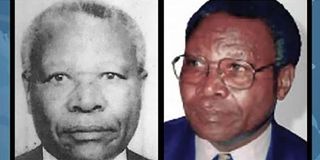Genocide survivors welcome Kabuga transfer to Arusha tribunal

Rwandan genocide suspect Felicien Kabuga.
What you need to know:
- A French appellate court on Wednesday directed the transfer of Mr Kabuga.
- Survivors of the conflict, mainly Rwandan Tutsis and moderate Hutus, say the court's decision is in line with their expectations.
- Mr Kabuga's lawyers argued against his transfer to Tanzania on health grounds.
- His trial in Arusha will represent the IRMCT's first case at the pre-trial stage.
Kigali
Survivors of the Rwandan genocide have welcomed the decision to transfer suspect Felicien Kabuga from France to Tanzania for trial at the United Nations tribunal in Arusha.
A French appellate court on Wednesday directed the transfer of Mr Kabuga, who until this year was the most wanted fugitive of the Rwandan genocide, for trial at the Arusha-based UN International Residual Mechanism for Criminal Tribunals (IRMCT).
Survivors of the conflict, mainly Rwandan Tutsis and moderate Hutus, say the court's decision is in line with their expectations.
"We expected no other decision from the French court, and we welcome it. Kabuga's trial in Arusha shows that the leadership at the IRMCT has changed for the better," Jean-Pierre Dusingizemungu, President of IBUKA, the genocide survivors' umbrella body, told the Nation.
Opposed transfer
However, at the French court, Mr Kabuga's lawyers argued against his transfer to Tanzania on health grounds. They said they fear that it is risky to transfer the elderly suspect during the coronavirus pandemic.
The 87-year-old Kabuga still has a few avenues to appeal to, including the European Court of Human Rights, in an attempt to avoid being sent to Arusha for trial.
"Kabuga was wanted by the International Criminal Tribunal for Rwanda (the predecessor of IRMCT), which had issued an arrest warrant for more than twenty years, so it is only normal that this jurisdiction has the primacy of trying the suspect," Jean-Damascène Bizimana, executive secretary of National Commission for the fight against genocide (CNLG), said.
"Transferring Kabuga to Arusha will enable local justice to be delivered. Since Tanzania borders Rwanda, the trial will easily be monitored than if it were to take place in a more distant country. Arusha will enable witnesses to get there quite easily."
His trial in Arusha will represent the IRMCT's first case at the pre-trial stage, with others it has handled mainly being appeal cases.
The Arusha-based tribunal is expected to hand down a verdict on the appeal by Ratko Mladić, a former Commander of the Main Staff of the army of the Serbian Republic of Bosnia and Herzegovina, who was convicted in 2017 by the International Criminal Tribunal for the former Yugoslavia (ICTY). It has also handled the retrial of Jovica Stanišić, a former head of State Security Service of the Republic of Serbia. He had been acquitted earlier by the ICTY.
Richest man in Rwanda
Kabuga was considered the richest man in Rwanda at the time of the 1994 genocide. Most of his vast wealth came mainly from tea businesses.
He was arrested in France in May after 25 years of evading capture, for which the US had placed a USD5 million bounty.
He was indicted by the ICTR on one count of genocide, one count of complicity in genocide, one count of direct and public incitement to commit genocide, one count of attempt to commit genocide, one count of conspiracy to commit genocide and two counts of crimes against humanity by persecution and extermination.
The crimes are said to have been committed in Rwanda between April 7 and July 17, 1994.
According to the indictment that was updated in 2011, Kabuga is alleged to have operated "hate radio" station RTLM to further ethnic hatred and incite Hutus to kill Tutsis.
"Kabuga instructed, assisted and prompted members of the Interahamwe militia who participated in the killing and harming of Tutsis in Kigali Ville, Kimironko sector, Kigali, Kibuye and Gisenyi prefecture," the indictment reads.
He participated in the establishment of the National Defence Fund that was used to raise money to provide financial and logistical support for the Interahamwe to kill and harm Tutsi.
In August 2012, Kabuga's file was handed over to the prosecutor of the IRMCT Mechanism, after which a judge at the tribunal issued a warrant in 2013 requesting all member states of the UN to search for and arrest him.
Preparation for trial
The mechanism prosecutor, Serge Brammertz, and his team of investigators visited Kigali from August 25 to September 3 where he met multiple officials in preparation for trial and collection of evidence against Kabuga.
He is preparing a report that is expected to be presented to the UN Security Council in December.
The UN established the ICTR in Arusha back in 1994 to capture and try top genocide suspects. Over 60 individuals were sentenced at the court until it was formally closed in 2015.
The Mechanism for International Criminal Tribunals replaced it to track and bring to trial the remaining genocide fugitives that are still on the run.





